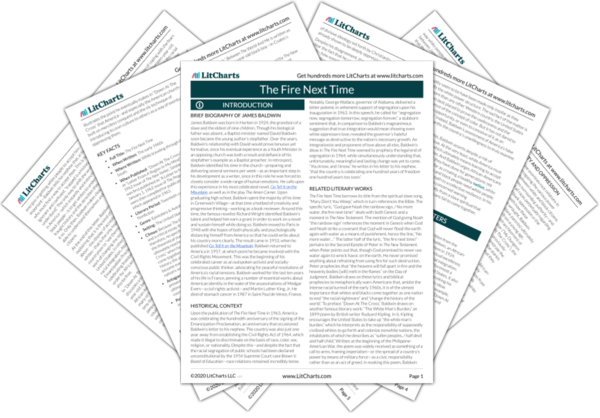Reflecting Baldwin’s gift for holding two seemingly-contradictory ideas in his mind at once, the church in The Fire Next Time simultaneously represents oppressive authority and hope and community. Baldwin, whose abusive father was a minister, grew up with religion at the center of his family life. As Baldwin sees it, the church’s oppressive potential has many facets. First, a focus on spirituality over action can encourage black parishioners to become complacent with their lives, rather than agitating for concrete improvements. Second, the Christian church’s emphasis on spreading the gospel has justified centuries of brutal imperialism and subjugation. Related to this, Baldwin identifies in theology—both Christian and, interestingly, in the theology of the black nationalist religious group the Nation of Islam—a strain of “us versus them” thinking that is used to justify many social ills, including racism. Therefore, Baldwin believes that a truly moral life cannot be one lived blindly in thrall to organized religion. At the same time, Baldwin acknowledges the many positive aspects of religion. As an adolescent, for example, Baldwin’s involvement with the church kept him from falling into criminal activity and gave him purpose and community. Baldwin describes the blissful unity he experienced while preaching: “Their pain and their joy were mine, and mine were theirs.” In a way, this is exactly the kind of unity Baldwin hopes America might someday find, though he doesn’t believe that religion is the proper means of achieving understanding and integration. Because the Christian church was built on oppression and conquest, he yearns for a secular means of banding together.
The Church Quotes in The Fire Next Time
Well, he is dead, he never saw you, and he had a terrible life; he was defeated long before he died because, at the bottom of his heart, he really believed what white people said about him. This is one of the reasons that he became so holy…You can only be destroyed by believing that you really are what the white world calls a nigger.
Neither civilized reason nor Christian love would cause any of those people to treat you as they presumably wanted to be treated; only the fear of your power to retaliate would cause them to do that, or to seem to do it, which was (and is) good enough. There appears to be a vast amount of confusion on this point, but I do not know many Negroes who are eager to be “accepted” by white people, still less to be loved by them; they, the blacks, simply don’t wish to be beaten over the head by the whites every instant of our brief passage on this planet.
Every Negro boy—in my situation during those years, at least—who reaches this point realizes, at once, profoundly, because he wants to live, that he stands in great peril and must find, with speed, a “thing,” a gimmick, to lift him out, to start him on his way. And it does not matter what the gimmick is. It was this last realization that terrified me and—since it revealed that the door opened on so many dangers—helped to hurl me into the church. And, by an unforeseeable paradox, it was my career in the church that turned out, precisely, to be my gimmick.
I rushed home from school, to the church, to the altar, to be alone there, to commune with Jesus, my dearest Friend, who would never fail me, who knew all the secrets of my heart. Perhaps He did, but I didn’t, and the bargain we struck, actually, down there at the foot of the cross, was that He would never let me find out.
Perhaps we were, all of us—pimps, whores, racketeers, church members, and children—bound together by the nature of our oppression, the specific and peculiar complex of risks we had to run; if so, within these limits we sometimes achieved with each other a freedom that was close to love.
We had the liquor the chicken, the music, and each other, and had no need to pretend to be what we were not. This is the freedom that one hears in some gospel songs, for example, and in jazz. In all jazz, and especially the blues, there is something tart and ironic, authoritative and double-edged. White Americans seem to feel that happy songs are happy and sad songs are sad, and that, God help us, is exactly the way most white Americans sing them—sounding, in both cases, so helplessly, defenselessly fatuous that one dare not speculate on the temperature of the deep freeze from which issue their brave and sexless little voices.
In the realm of power, Christianity has operated with an unmitigated arrogance and cruelty—necessarily, since a religion ordinarily imposes on those who have discovered the true faith the spiritual duty of liberating the infidels. This particular true faith, moreover, is more deeply concerned about the soul than it is about the body, to which fact the flesh (and the corpses) of countless infidels bears witness. It goes without saying, then, that whoever questions the authority of the true faith also contests the right of the nations that hold this faith to rule over him—contests, in short, their title to his land. The spreading of the Gospel, regardless of the motives or the integrity or the heroism of some of the missionaries, was an absolutely indispensable justification for the planting of the flag.












